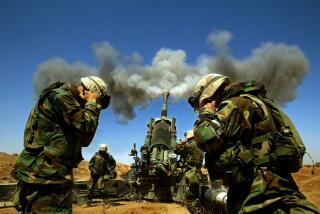Figuring the Butcher’s Bill : Gulf: Congress must reclaim its powers and hold hearings on whether to go to war.
- Share via
We are more than three months into a crisis that has felt to me like reliving the late summer and fall of 1964. There’s no pleasure in the memory. I thought the country had learned better; I didn’t believe Congress could forget so much.
Once again I have been watching the executive branch moving fast toward launching a war that might well be catastrophic, a war that we could avoid, a war that the great majority of the public would almost surely reject if they understood what it would probably mean.
The Center for Strategic and International Studies calculates that 30,000 American soldiers would be killed or wounded if the Iraqis conduct a fighting withdrawal from Kuwait, higher if the Iraqis “fight to the death defending current positions,” to say nothing of allied or civilian casualties. Even Vietnam did not prepare us for the pace and scale of the projected slaughter. The greatest contrast from 1964 is that this time, the Administration has hardly concealed its preparations for a big war. Yet just as in that campaign summer of ‘64, Congress, the media, the churches and campuses, the public at large have been doing little to resist or even question the imminent prospect of such carnage.
On Election Day, 1964, American voters were registering a landslide vote largely against Barry Goldwater’s proposals to bomb North Vietnam--which we incumbents (I was the special assistant to an assistant secretary of defense) were, in secret, expecting to implement. When the steady bombing campaign did begin in February, initiating the most deadly and costly phase of the Vietnam War, insiders like me knew what to expect, but it came without warning to Congress or the public. Congress had that excuse for having failed to stop it
Now our constitutional system is again failing to operate as the framers intended, failing to protect us from an unnecessary, highly dangerous and predictably unpopular war. Almost eerily, the prospect of American young men and women killing and dying in the Arabian desert was virtually no factor in electoral races.
Perhaps Hussein will back down in face of our threats and withdraw from Kuwait unconditionally. Perhaps Arab states and other allies will broker a deal, even against U.S. wishes. Perhaps the United States and its allies will wait indefinitely for the embargo to take effect. Perhaps Administration threats of offensive action have been bluffs from the beginning. Or perhaps we are headed into a terrible war.
What is clear, however, is that so far the choices have been left entirely to President Bush, uninstructed by any congressional hearings, investigations, resolutions or budget constraints that give him any guidance whatever on the choice between war or peace. Congress has failed even to invoke the War Powers Act and has passed resolutions that, in effect, give George Bush the powers of George III. And that is a scandal: a failure of our constitutional system and of our democracy as shocking and dangerous as that in 1964.
We must demand that Congress take its powers back. “Consultation” is grossly inadequate. The framers of the Constitution got it right the first time, in giving the decision whether or not to go to war exclusively to Congress, and denying it to the executive--which in Madison’s words to Jefferson is “the branch of power most interested in war, and most prone to it.”
What the country is really owed are immediate congressional hearings that compel testimony not on whether the President will send us into war, but should Congress do so. What are the best estimates of civilian casualties from U.S. air strikes? Under what conditions might a ground war be extended throughout Iraq, and what are estimated U.S. casualties? What casualties might Iraq inflict by retaliatory attacks ? How would such a war affect the world economy? What is the likelihood of terrorist attacks in the West? In short, what will be “the butcher’s bill”?
Remember Ron Kovic’s words: “Didn’t we promise ourselves we would never let this happen again?”
More to Read
Sign up for Essential California
The most important California stories and recommendations in your inbox every morning.
You may occasionally receive promotional content from the Los Angeles Times.













